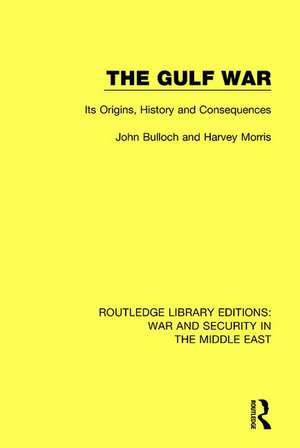The Gulf War: Its Origins, History and Consequences: Routledge Library Editions: War and Security in the Middle East
Autor John Bulloch, Harvey Morrisen Limba Engleză Paperback – 2 oct 2017
| Toate formatele și edițiile | Preț | Express |
|---|---|---|
| Paperback (1) | 356.44 lei 6-8 săpt. | |
| Taylor & Francis – 2 oct 2017 | 356.44 lei 6-8 săpt. | |
| Hardback (1) | 819.90 lei 6-8 săpt. | |
| Taylor & Francis – 11 iul 2016 | 819.90 lei 6-8 săpt. |
Preț: 356.44 lei
Nou
Puncte Express: 535
Preț estimativ în valută:
68.21€ • 74.07$ • 57.30£
68.21€ • 74.07$ • 57.30£
Carte tipărită la comandă
Livrare economică 22 aprilie-06 mai
Preluare comenzi: 021 569.72.76
Specificații
ISBN-13: 9781138671027
ISBN-10: 1138671029
Pagini: 346
Dimensiuni: 156 x 234 x 18 mm
Greutate: 0.45 kg
Ediția:1
Editura: Taylor & Francis
Colecția Routledge
Seria Routledge Library Editions: War and Security in the Middle East
Locul publicării:Oxford, United Kingdom
ISBN-10: 1138671029
Pagini: 346
Dimensiuni: 156 x 234 x 18 mm
Greutate: 0.45 kg
Ediția:1
Editura: Taylor & Francis
Colecția Routledge
Seria Routledge Library Editions: War and Security in the Middle East
Locul publicării:Oxford, United Kingdom
Public țintă
Postgraduate and UndergraduateCuprins
1. Khomeini’s Poisoned Chalice 2. Preparations for War 3. Iraq’s Failed Blitzkrieg 4. Iran and Iraq: Internal Wars 5. Exporting the Islamic Revolution 6. Khorramshahr: the City of Blood 7. America: the Great Satan 8. The Turn of the Tide 9. Reluctant Allies: the Threat to the Arab Gulf 10. Secret Arms Deals 11. The Soviet Union: the Other Satan 12. The Struggle for Power in Tehran 13. The War at Sea: America Joins In 14. New Battles to Settle Old Scores 15. Islam Divided: the Conflict Remains
Descriere
After a million deaths and twice that number injured, after the destruction of much of the infrastructure of Iran and Iraq, disruption of trade throughout the Gulf and the involvement of the USA and USSR, was the Gulf War a pointless exercise, a futile conflict which achieved nothing and left the combatants at the end of it all back in exactly the same position from which they started in 1980? In this book, first published in 1989, the authors argue that the lack of territorial gain was irrelevant: the real advantages won by each side were far more important, intangible though they were. For Iran, the channelling of the energies of her people away from domestic concerns meant the continuation of the Islamic revolution and ensured the stability of the mullahs. In Iraq, the war propped up the increasingly shaky regime of Saddam Hussein. The outside world, especially the superpowers, was terrified of the spread of Muslim fundamentalism, so made no effort to prevent Iraq from trying to halt this spread. But Israel, Saudi Arabia, Syria and the oil states also had vested interests in promoting the continuation of the war.
























